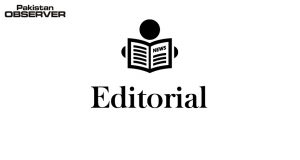AS the nation celebrated ‘Yaum-e-Takbeer’ on 28 May, there was widespread concern over continued denial of fundamental rights of legendary scientist of the country Dr A Q Khan, who is unfortunately being treated like a murderer. There is growing demand that restrictions imposed on free movement of Dr Khan should be removed to restore honour and dignity of the personality that played pivotal role in making Pakistan a nuclear power.
There can be no denying the fact that the nation feels both proud and satisfied over contribution of nuclear deterrence in strengthening the overall security and defence of the country. People of Pakistan, armed forces and defence commentators are unanimous in their opinion that nuclear capability is serving the cause of the defence and security effectively. Today Pakistan is facing a multitude of serious problems and challenges but security threats emanating from the eastern border have been mitigated due to nuclear strength and capability of the country. It is also widely acknowledged that Dr A Q Khan is father of Pakistan’s nuclear programme and played a lead role in making the country a nuclear power. In a letter written to the then Editor-in-Chief of this newspaper (late) Zahid Malik in August 1999, former President of Pakistan and President of Board of Governors of GIK Institute Ghulam Ishaq Khan, who, in his different capacities was privy to various developments in the evolution of the country’s nuclear programme, paid rich tribute to Dr Khan for his ‘ingenious’ work and making ‘invaluable contribution to the defence and security of the country. He remarked that Dr A Q Khan was able to establish KRL, one of the most outstanding institutions, at par with some of the best in the world in the field of defence production and research, at a fraction of the cost being incurred at that time by other countries and institutions engaged in similar exercise. Dr Qadeer gave Pakistan a technology, which no country of the world is ready to share with others and this makes his contribution and achievements historic. Apart from nuclear technology, the institution he established also helped fulfilled the dream of the country to have indigenous production of missiles and a whole range of other battle-field weapons including anti-tank device, multi-barrel guns and night vision appliances. It is because of his invaluable contribution to the defence and security of the country that Dr Khan is rightly regarded to be a national hero by every Pakistani. However, the treatment being meted out to him for the last over one decade is unfortunate and regrettable. It is not the way nations treat their heroes and it is legitimately apprehended by patriotic Pakistanis that the ill-treatment of Dr Khan would send negative signals and message to all those who are imbued with similar spirit of serving the cause of the country in different fields in different ways. The role of Dr Khan in the development of Pakistan’s nuclear programme demanded that his services should have been utilized for the cause of defence and security during his entire lifetime. However, he was not only sidelined but humiliated but restrictions also imposed on his free movement on the pretext of personal security whereas provision of elaborate and foolproof security to a national hero should not be an issue. Frustrated by the continued denial of fundamental rights, Dr Khan has been knocking at the doors of the judiciary for the last several years but nothing concrete has emerged so far. Dr A Q Khan has a knack for productive work and his services should be utilized for accelerating the pace of progress and development in Pakistan. However, if, for understandable reasons, the Government is unable to benefit from his acumen anymore, then he should be allowed free movement so that he could engage himself in a manner he deems fit for the sake of his country. There are numerous institutions that would surely want him to play his role in advancing the causes they pursue. Therefore, we would urge the apex court to review his case on a priority basis and remove restrictions on his free movement. It has also become a humanitarian issue as uncalled for restrictions are adding to stress the 84-year old nuclear scientist feels due to multiple complications.









